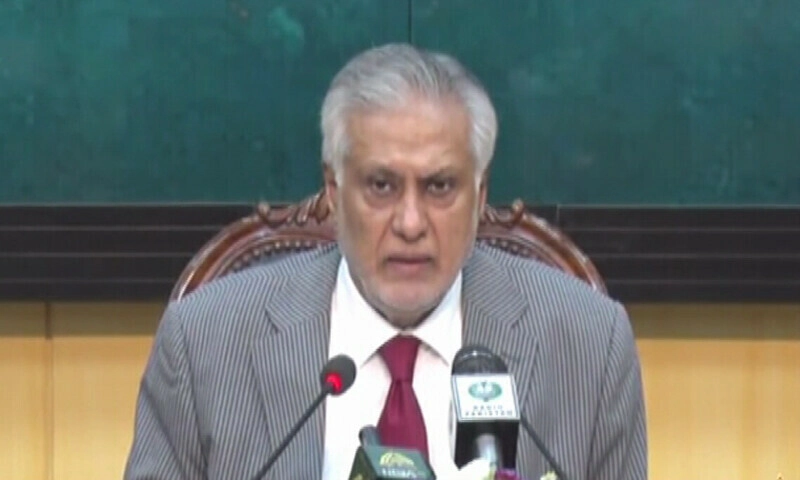- Web Desk
- Feb 24, 2026
China ready to launch CPEC Phase-II: Ishaq Dar
-

- Web Desk
- May 22, 2025

ISLAMABAD: Deputy Prime Minister and Foreign Minister Ishaq Dar said on Thursday that his recent visit to China had been “extremely successful,” with Beijing reaffirming its support for Pakistan’s sovereignty and territorial integrity.
He said China had expressed readiness to initiate the second phase of the China-Pakistan Economic Corridor (CPEC) Phase-II with Pakistan and reiterated its support on the Kashmir issue.
Addressing a press conference in Islamabad, Dar said that Pakistan, China and Afghanistan had reached a consensus on eliminating terrorism from the region.
“We discussed launching CPEC Phase-II with China, and they are willing to move forward with this government,” he said.
Dar had visited China on a special invitation from his Chinese counterpart. He held key meetings with Chinese officials on Tuesday and attended a trilateral meeting of the foreign ministers of Pakistan, China, and Afghanistan on Wednesday. Discussions at the meeting focused on Afghan refugees, regional dynamics, and trade.
Also read: Beijing says Afghanistan and Pakistan aim to upgrade diplomatic ties
He noted that agreements made during his April 19 visit to Kabul had already been implemented in Pakistan.
Acknowledging criticism that Pakistan often delays implementation, Dar said, “We ensured execution of the agreements signed with Afghan Foreign Minister Amir Khan Muttaqi in Kabul.” He also thanked China for its consistent support.
Recalling the beginning of Pakistan-China diplomatic relations on May 21, 1951, Dar said the friendship between the two nations is widely respected.
He confirmed that the next round of the Pakistan-China Strategic Dialogue would be held in Islamabad and that the Chinese foreign minister had accepted an invitation to visit Pakistan soon.
Dar reiterated China’s renewed support on the Kashmir dispute and said he had been in contact with representatives from nearly 60 countries between April 23 and May 10.
“We did not allow the narrative of our neighbour to dominate and exposed their lies to the world,” he said, referring to India’s claim of shooting down an F-16 jet. “We told India that unlike them, we are not cowards. If we strike, we will do so with prior warning.”
On India’s stance, Dar said, “Their narrative after Pulwama has failed. What we did was purely in self-defence. The ceasefire continues successfully in a phased manner.”
Commenting on the Pahalgam incident, Dar said Pakistan had offered an independent investigation. “Between 2017 and 2018, terrorism had been eliminated from Pakistan. Unfortunately, due to internal issues, it has resurfaced,” he said. Referring indirectly to former DG ISI Faiz Hameed’s Kabul visit, he remarked, “An important individual once went to Kabul for tea. We are now doing everything we can to eradicate terrorism.”
Dar said the three countries had agreed not to allow their soil to be used for terrorism. “We thanked China for its support regarding the IMF bailout,” he added.
The deputy premier also revealed that during the first PDM government, work had started on a Pakistan-Afghanistan rail transit project that included Uzbekistan. “We discussed this project with China, and they expressed interest in investing.”
He said the Pakistan-Uzbekistan-Afghanistan rail transit project was nearing finalisation, and discussions were underway to extend China’s Belt and Road Initiative (BRI) into Afghanistan. Talks were also held on the Peshawar-Kabul highway project. “If China constructs the highway from Peshawar to Kabul, it will provide Central Asia with easier access and fully activate the Gwadar Port,” he said.
Dar condemned the recent violence in Khuzdar, calling it heartbreaking. “God willing, terrorism will soon be eradicated from the region. The days of these terrorists are numbered,” he asserted.
He stressed that diplomatic and trade discussions had also taken place in China. “We made it clear that Afghan soil must not be used for terrorism against Pakistan. We are introducing a one-document regime for Afghan refugees and will issue one-year multiple-entry visas at a fee of $100.”
Dar noted China’s deep strategic interests in Pakistan and said all three countries—Pakistan, China, and Afghanistan—had agreed to act firmly against all terrorist groups without exception.
He further disclosed that China was taking a major initiative to create an “International Organisation for Mediation,” modelled after the Asian Infrastructure Investment Bank (AIIB). The organisation will be headquartered in Hong Kong, with documents expected to be signed on May 30—although Pakistan has requested a short delay in the signing date.
The deputy prime minister said CPEC Phase-II would be extended into Afghanistan. Motorways would be built from Karachi to Hyderabad and Sukkur, followed by a highway from Peshawar to Kabul. “This will connect the trade corridor through Uzbekistan to Central Asia, and Gwadar Port will become fully operational in the true sense,” he said, adding that Pakistan aims to expand cooperation and connectivity across the region.
He criticised the South Asian Association for Regional Cooperation (SAARC), saying it had failed due to one country’s intransigence—referring to India’s “stubbornness and hegemonic tendencies.”
Dar concluded by saying that if SAARC countries were integrated into the Belt and Road Initiative (BRI), a strong regional bloc could emerge. “If we connect the missing link, upgrade the railway from Karachi to Peshawar, and link Central Asia to global trade via Gwadar, the entire region, including Pakistan, could embark on a new era of development.”




